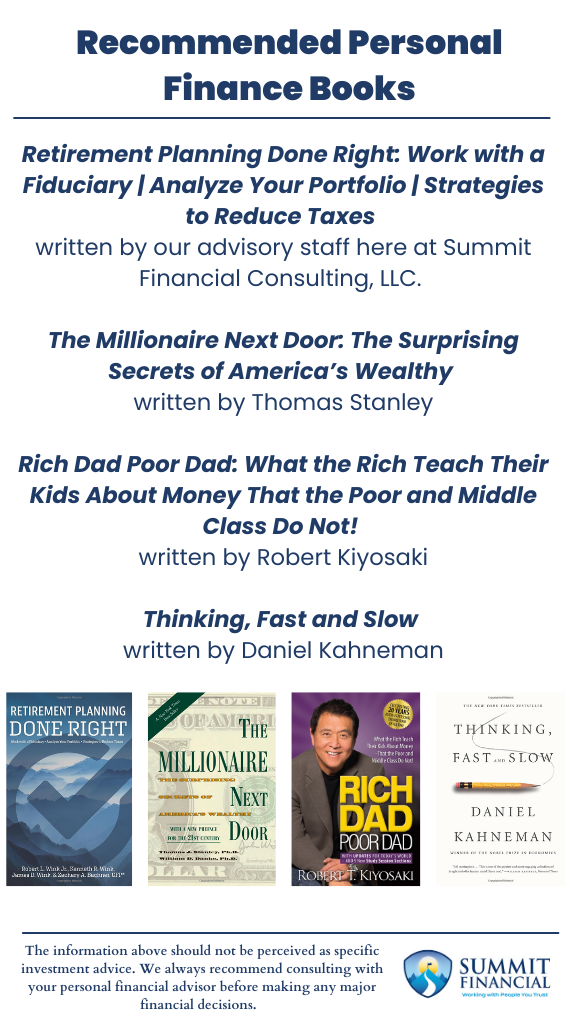- Retirement Planning Done Right: Work with a Fiduciary | Analyze Your Portfolio | Strategies to Reduce Taxes written by our advisory staff here at Summit Financial Consulting, LLC.
- The Millionaire Next Door: The Surprising Secrets of America’s Wealthy written by Thomas Stanley
- Rich Dad Poor Dad: What the Rich Teach Their Kids About Money That the Poor and Middle Class Do Not! written by Robert Kiyosaki
- Thinking, Fast and Slow written by Daniel Kahneman
This month we have decided to dedicate a blog post to a few of our most recommended books. We have clients ask from time to time about resources that we can recommend to help further their personal finance knowledge.
Everyone is in a different situation at a different time in their lives so while all of these books are valuable, some may be more appropriate than others at a given time. We believe all of them are extremely useful, but we recommend speaking with your personal advisor if you want a more specific suggestion on which book you should read first.

1. Retirement Planning Done Right
We may be a little biased about this, but one of our top suggestions is a book written by our advisory staff here at Summit. Retirement Planning Done Right: Work with a Fiduciary | Analyze Your Portfolio | Strategies to Reduce Taxes is a very high-level overview of the type of business we run and the financial planning we perform.
This book is great for those who are venturing into their own personal finances for the first time as it explains what we think are the key areas of focus such as Risk Tolerance, Social Security, Accumulation vs. Distribution Stages, and much more.
We also spend some time detailing key attributes you should look for in a financial advisor before you begin to work with one. We understand we may not be the best fit for everyone, but we still believe we hold values that are important to serving clients appropriately and we believe these should be a requirement to some extent for every advisor.
2. The Millionaire Next Door
One of the most widely applicable reads we suggest is The Millionaire Next Door: The Surprising Secrets of America’s Wealthy, written by Thomas Stanley.
We feel this book is great for everyone regardless of their situation since it preaches smart budgeting and aggressive saving. The content within this book can be eye opening as it reveals some truths about what the “average” millionaire is like and how they may not match our expectations.
It is possible to achieve millionaire status if you routinely and aggressively set aside savings for retirement and set strict boundaries on your budget, even if you only have a modest income.
It is very common for high income earners to become subject to “Lifestyle Inflation” as they begin buying larger homes, more cars, and even that expensive boat. This type of spending can be the biggest hurdle to reaching millionaire status and this book does a wonderful job illustrating this concept. In a comparison of the tortoise versus the hare, sometime the boring route can be the most successful.
3. Rich Dad Poor Dad
For those who want to be more active with their investment and money management, we recommend reading Rich Dad Poor Dad: What the Rich Teach Their Kids About Money That the Poor and Middle Class Do Not! written by Robert Kiyosaki.
We feel one of the best features of this book is that the author illustrates the important lessons through recalling various personal life experiences. It reads more like a story than it does an educational resource.
The concepts in the book revolve around finding smart ways to grow your assets and having your money work for you. Yes, stocks and bonds are great investments over the long-term, but they may not have the highest return potential, especially for someone who is willing to put in some extra work on their end.
Whether it is acquiring a real estate portfolio or starting a small business, there are investments out there that might generate a high return and a consistent income stream.
This book also spends some time highlighting issues in the education system and society broadly as it explains assets and liabilities, which leads to the revelation that your home may not be the great investment you thought it was. Also, it is important for parents to obtain a financial education so they can pass it on to their kids if the school system will not.
4. Thinking Fast and Slow
Our final recommendation for this blog is a book that focuses on decision-making broadly with aspects that certainly apply to personal finances.
Our view is that Thinking, Fast and Slow written by Daniel Kahneman is a great resource that applies to many aspects of life whenever a decision needs to be made. Daniel Kahneman is a world-renowned psychologist and is also a Nobel prize winner.
This book encompasses many of the lessons he has learned throughout his life and helps readers identify why they think the way they do. He explains the differences between the quick reactions of System 1 and the slower deliberate decisions of System 2 in addition to a handful of biases that affect how we derive our choices.
This book is great for those who are more analytical and want to make sure they are making a decision with a clear mind.
Emotions can be a huge hurdle when it comes to investments, and in our opinion, this resource is the perfect tool to help ensure you are making the most well-informed, non-biased decision at that time.
Speak With a Trusted Advisor
If you have any questions about Behavioral Finance, taxes, your individual investment portfolio, retirement planning, our 401(k)-recommendation service, or anything else in general, please call our office at (586) 226-2100. Please feel free to forward this commentary to a friend, family member, or co-worker. If you have had any changes to your income, job, family, health insurance, risk tolerance, or your overall financial situation, please give us a call so we can discuss it.
We hope you learned something today. If you have any feedback or suggestions, we would love to hear them.
Best Regards,
Zachary A. Bachner, CFP®
with contributions from Robert Wink, Kenneth Wink, and James Wink.
If you found this article helpful, consider reading:
- Different Types of Debt
- Understanding Behavioral Finance
- Tax Filing Status Options Explained
- Acceleration and Deceleration for Investors
Sources:
- https://www.amazon.com/gp/product/B0B9FQBDSX/ref=ppx_yo_dt_b_asin_title_o00_s00?ie=UTF8&psc=1
- https://www.amazon.com/Thinking-Fast-Slow-Daniel-Kahneman/dp/0374533555/ref=sr_1_1?crid=14N39AFZAMB4K&keywords=thinking+fast+and+slow&qid=1678379603&s=books&sprefix=thinking+fast+and+slow%2Cstripbooks%2C105&sr=1-1
- https://www.amazon.com/Millionaire-Next-Door-Surprising-Americas/dp/1589795474/ref=sr_1_1?crid=22SK71RI4XBF4&keywords=millionaire+next+door&qid=1678379619&s=books&sprefix=millionarie+next+doo%2Cstripbooks%2C95&sr=1-1
- https://www.amazon.com/Rich-Dad-Poor-Teach-Middle/dp/1612681131/ref=sr_1_1?keywords=rich+dad+poor+dad&qid=1678379627&s=books&sprefix=rich+dad%2Cstripbooks%2C110&sr=1-1
- https://summitfc.net/behavioral-finance/


